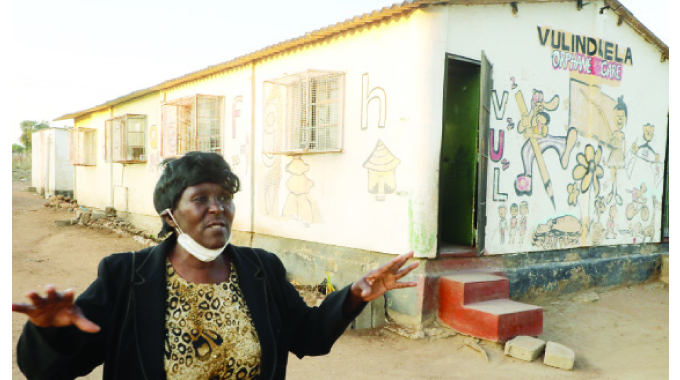With just $50 gogo’s dream comes true

Thandeka Moyo-Ndlovu, Senior Health Reporter
IN 2006, HIV and Aids claimed the lives of more than 160 000 Zimbabweans, including that of Sinini* who died at Mpilo Central Hospital, leaving a two-month-old baby.
The pandemic wreaked havoc in many homes leaving thousands without parental love and guidance, a sad development which propelled Ms Patricia Tshabalala (67) to start an orphanage with just ZW$50.
She vividly remembers Sinini’s skeletal structure tucked inside sheets on her bed.

Ms Patricia Tshabalala of Vulindlela Children’s Home in the library
Sinini’s husband had died a few weeks into her second trimester before she too started showing that her immune system had been greatly compromised.
“Please take care of my daughter because I can feel that I am dying,” is all Sinini said to Ms Tshabalala who felt pity for the tiny baby whose life changed for good as her mother didn’t live for two more weeks.
After a series of blood tests, counselling and support from like-minded friends, Ms Tshabalala accepted Sinini’s request.
She took in the little girl, breastfed and raised her as her own.
The girl was an addition to Ms Tshabalala’s eight biological children.
Before she knew it, several other kids in the neighbourhood lost both parents to HIV and due to stigma, they were left without any parental care.
Born in a family of seven in Ntabazinduna, Matabeleland North province, Ms Tshabalala’s love for children was nurtured during her youthful days as her late father wanted her to be a teacher.
She always had chalks and would mimic teaching with her many dolls before she became the community’s favourite sister as she would voluntarily accompany other children to and from school.
She did not pass her O-level with flying colours but managed to do a course in early childhood development knowing that she would need the skills one day.
“I started taking care of orphans and vulnerable children in 2006 when Aids left many without parents or elders to take care of them.
I would visit their sick and struggling parents who just died leaving hundreds of children without anyone,” said Ms Tshabalala.
“I took in one of my adopted children when she was 2 months old and decided that I would breastfeed her as I could not afford to buy the fancy baby food.
I got medical advice and did some tests after I was assured that taking her in would not put any of us at risk of contracting Aids which was so deadly during those days.”

Japhet Ndabeni Ncube
Former Bulawayo Mayor Japhet Ndabeni Ncube heard about the baby that Ms Tshabalala was breastfeeding and mobilised baby clothes, blankets and food to help her cope with her growing responsibility.
“We went through challenging times with my children, sometimes we went to bed hungry but we remained hopeful that as long as we at least have family, better days were coming.
It’s amazing to see how she has grown into a beautiful young woman and is currently pursuing a hotel management course in one of the colleges,” she said.
From her four-bedroomed house she is renting in Mpopoma, Ms Tshabalala eventually started Vulindlela, a centre which was dedicated to the care of children.
Her passion saw her partnering with organisations like Matabeleland Aids Council, National Aids Council to help children who could not be easily accepted by extended families as their parents had died of HIV and Aids.
“When I started Vulindlela which is a registered community-based trust, my hope was to at least educate children who no longer had any access to care.
With just $50 I took my first 10 children to school and would approach donors and other organisations to help with uniforms and food.”
Vulindlela currently houses two families and provides three meals a week to about 63 vulnerable children.
“Children who are living with HIV are struggling, they sometimes go without food and no one to care.
I share my groceries with them and give them three meals per week depending on supplies.
At the moment we are feeding 63 children.
They get three meals per week because we also have shortages in terms of supplies,” she said.
“I had eight biological children, three are late and had to adopt three more whose situations touched me.
I used to work in industries long back but as the number of children in need increased, I decided to dedicate my whole life and fend for their rights which led to me and my husband separating.
I now live off knitting, selling wares and menial jobs which help to raise money for food, upkeep, clothes and school fees for the children I am taking care of.”
Besides taking care of needy and vulnerable children from Mpopoma, Matshobana and other surrounding areas, Ms Tshabalala is also an activist, vocal in ending abuse of children.

ECD
She said she wishes to own an ECD centre and a school one day to accommodate all children who are currently not at school.
Ms Tshabalala said at the moment, she has received funds to pay for 53 learners but has more than 20 children who are not in school due to lack of funds.
Ms Tshabalala said some of the children she has helped have relocated to other countries and are helping her take care of others as need keeps increasing.
She pleaded with well-wishers to help her with clothes, blankets and food for the children.”
“I can safely say from 2006 I have helped more than 4 000 children go to school through handouts from organisations and well-wishers.
However, besides school fees, many of them struggle without food, clothes and blankets.
There are so many vulnerable children in our community and sadly I cannot help all of them,” she said.
– @thamamoe.












Comments